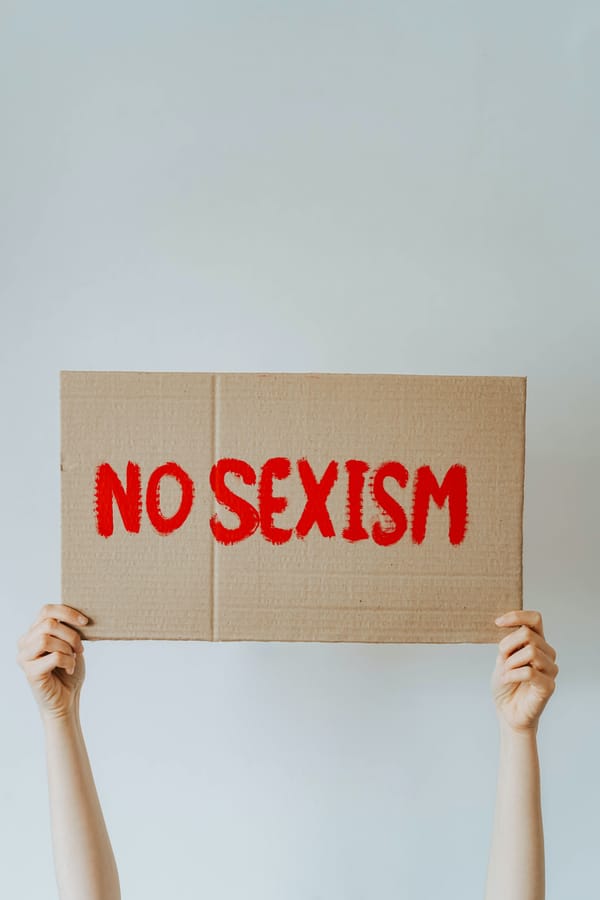Men’s Issues Are Real: It Is Feminism That’s Tackling Them
A second response to the article which proposed critiques of modern-day feminism.

In a previous edition of Felix, a few of you may have stumbled across an article titled “Is Modern Day Feminism Flawed?” in the Comment section. It is rather fitting that the previous article starts by misattributing a quote to Aristotle that he never wrote, as it then proceeds to misattribute many positions to feminism that the movement does not represent.
Its writer attempts to argue that modern-day feminism completely overlooks men’s issues in favour of women’s superiority, which is a complete falsehood. The writer seems to perpetuate the idea of feminism only addressing the systemic and societal issues faced by women, whereas in reality, feminism aims to tackle the system of gender norms instilled in society by the patriarchy that negatively affect both men and women. The phrase ‘equality of the sexes’ means just that: equal rights, opportunities and outcomes for both men and women in all areas. Giving women more rights does not mean taking them away from or oppressing men, something the author heavily implies.
The author also purports that the existence of the patriarchy is dubious and is a gross exaggeration of the wealth and power of a tiny proportion of men in society. In reality, the patriarchy is a system that puts men in charge of society, reactively and proactively, rather than a system in which some men are “on top” of a social hierarchy. This idea is multilayered: permeating through inequalities against women at the legal, professional, and domestic levels. Upheld by cultural norms, tradition, education, and history, this structure of power relations is reproduced. Because this is a societal structure rather than individual sexist acts, the idea of the patriarchy, therefore, accommodates how not all men actively uphold or benefit from it, just as how not all women dislike it: we all participate, however unwillingly. For example, a woman can enforce the patriarchy by victimising a man and telling him to “man-up” in an emotionally traumatic situation. The patriarchy doesn’t mean that all men have it easy or that the average man’s life is easier than the average women’s just by default. Instead, it means that society is built in such a way with certain expectations based on gender and that because of this, men have access to types of benefits unavailable to women.
Giving women more rights does not mean taking them away from or oppressing men.
The issues of male suicide, forced conscription, high incarceration, and imbalanced divorce court rulings are used as ways to point the finger at feminism being ‘one-sided’ and never standing up in support of men, but these are all examples of how the patriarchy negatively affects men as well as women. This is why we see the issues pointed out by the author more prevalently in men - our patriarchal system expects men to be stronger, more violent and more self-sufficient than women. Therefore, men receive harsher punishment, are expected to do more violent and dangerous work and are expected to take care of themselves without help - financially, physically or mentally. While men experience these issues, women face the opposite - being considered weaker, more vulnerable, and dependent on men for support. However, just because men also face social difficulties that doesn’t mean they do not have the majority of positions of power in society. It’s a double-edged sword negatively affecting both genders, so when feminism says they want to dismantle the patriarchy, they don’t mean to take all the power away from men and allow women to be superior/oppressive, but it means taking apart these gender roles and stigmatisations and reducing issues stemming from them for both
Interestingly, the author also states, ‘even if we were to say that we have a patriarchal structure, the fundamental basis is the result of proficiency’. We can only assume he means that men are in more dominating positions of power & wealth because they are naturally better, smarter and more deserving. In truth, this sentence is nothing more than a sexist and outdated trope. Generalisations such as ‘women are naturally less good at STEM subjects or more nurturing’ have long been used as a means to further the idea that it is pointless to push for gender equality because it is not biologically possible. However, evidence has shown that this is not the case. In the past, people thought that men and women had significant differences in spatial awareness, mathematics, and reasoning skills, resulting in men being found in very skilled & higher-paying jobs. However, studies have shown that these biological differences are a fraction of a standard deviation, not enough to explain why men hold so much power in society. Instead, the continued discrimination and oppression of women stemming from gender expectations has made them seem this way.
Education and labour4.Women make up more than two-thirds of the world’s 796 million illiterate people. [“Rural Women and the Millennium Development Goals, 2021, UN Inter-Agency Task Force on Rural Women]5.Women represent only slightly more than 35% of the world’s STEM graduates and make up less than a third of the world’s researcher [The World’s Women 2020: Trends and Statistics, United Nations]6.On an average day, women globally spend about three times as many hours on unpaid domestic and care work as men (4.2 hours compared to 1.7). [The World’s Women 2020: Trends and Statistics [The World’s Women 2020: Trends and Statistics, United Nations]
The article only uses one statistic to back up its points, and unfortunately, it is a woefully false piece of misinformation. The inclusion of such misinformation to reinforce damaging stereotypes was not just an embarrassing mistake, but a serious oversight of a newspaper run by the students of a world-leading research university. The 53% figure cited as the percentage of “false rape cases” represents the proportion of rape cases that were dropped before making it to court. This could have been due to pressure from other parties, a lack of evidence, or simply the fear of having to go through the traumatic process of a rape trial. In reality, the rate of false rape accusations is no more prevalent than the rate of falsifying any other crime. Next time you hear someone questioning the validity of a rape accusation, I suggest you ask them if they would also doubt the person if they had claimed they had been mugged. The rate of rape, especially cases that go unreported, is terrifyingly high for all demographics. Perhaps it is time we stopped demonising rape victims and allowed them to come forward with their stories without having to face further trauma.
We want to conclude by saying that yes - you will be able to find women belittling men’s issues and calling it feminism online. You will also find strange men in suits going over the lyrics of WAP line by line, saying that it signals the fall of the West... the internet is a strange place, and you need to keep your wits about you. Remember that internet content is perfectly curated to your tastes and biases, so you need to step outside of your bubble to research an issue (which is not easy, but I’d hope an Imperial degree would equip us with a least some research skills). If you would like to learn more about feminism and how it can help men then feel free to get in touch.









